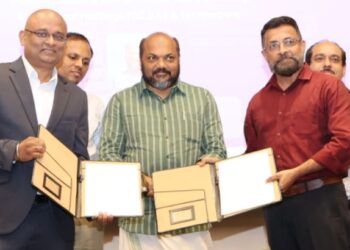The First National Biodiversity Congress, 2012, organized by the Kerala State Biodiversity Board with support from the National Biodiversity Authority and range of partners concluded here today after three days of scientific, policy and legal deliberations to make India a leader in translating the potential of biodiversity for sustainable national development and securing livelihoods of local communities.
The Congress, coming two months after India hosted the Eleventh Conference of Parties to the Convention on Biological Diversity (CBD COP 11), saw some very significant outcomes including the announcement of the proposal to establish a National Innovation Council on Biodiversity by Dr. Sam Pitroda, Chairman, Prime Minister’s Innovation Council. Joining the Congress through a video link at the inaugural session, he said the National Innovational Council on Biodiversity will develop decade long strategies to ensure biodiversity of the country is sustainably managed, benefits of biodiversity shared with communities and appropriate national policy and strategic frameworks relevant to biodiversity linked and mainstreamed so that investments on biodiversity become multi-pronged and multi-sectoral.
Reacting to this, the Chairman of National Biodiversity Authority (NBA), Dr. Balakrishna Pisupati said, “India becomes, perhaps, the first country in the World to have established such an innovation council for biodiversity that will be supported by the best intellectuals and talent in the country. This Council will add a significant feather in the cap of India’s Presidency for the Convention on Biological Diversity. This Council, I hope, will bring a sea-change in the way we deal with biodiversity and ecosystems in the country”.
During his Key Note Address to the Congress, Dr. R Chidambaram, Principal Science Advisor to Government of India, confirmed the establishment of a National Biodiversity Grid to facilitate and support the work of NBA in collating, analyzing and synthesis nation-wide biodiversity data and information for conservation and sustainable management of biodiversity of the country and also to assist appropriate policy making. The Grid, that will be established as a part of the National Knowledge Network (NKN) with assistance from Centre for Development of Advanced Computing (C-DAC) will provide an unique technology based platform for linking biodiversity based data and information across the country. The Grid will be used to assist NBA in creating a National Biodiversity Information Facility.
Mr. Shashi Tharoor, Minister of State for Human Resources Development, Government of India who inaugurated the Congress called for coordinated efforts to preserve the countries biodiversity and reiterated the need for maintaining a healthy ecosystem to help ourselves.


The Conference also bought together twenty state biodiversity boards (SBBs) across the country to discuss issues of implementation of the Biological Diversity Act and Rules with specific focus on preparation of Peoples’ Biodiversity Registers (PBRs) and strengthening the Biodiversity Management Committees (BMCs). The discussions during the sessions of SBBs elaborated the state level opportunities and challenges to preparing the PBRs. Complementing the pro-active approaches used by the Kerala State Biodiversity Board, the SBBs committed to completing the PBRs in timely manner to ensure biodiversity related information and knowledge are appropriately registered and future benefits shared with respective communities. Dr. Balakrishna Pisupati, Chairman, NBA said that the progressive support being provided by the Government of Kerala to the SBB is commendable and stands as a national model. He specifically thanked the Chief Minister of Kerala, Mr. Oommen Chandi, for his unstinted support to the State Biodiversity Board and the support being provided by the Department of Local Self Governance to the BMCs in effectively implementing the Biological Diversity Act.
The Congress also witnessed a range of presentations on various issues of topical interest in biodiversity. Presentations on behavioural ecology, Western Ghats biodiversity, agrobiodiversity conservation, nematode biodiversity, people’s participation in conservation, animal biodiversity, new advances in bioinformatics, biotechnology and others. The scientific sessions reiterated the need for conservation and sustainable management of biological resources, associated traditional knowledge besides ensuring appropriate capacity building at individual and institutional levels and raising the awareness of a range of stakeholders. Oral and poster presentations were also made during the Congress by research scholars and students from various states.















